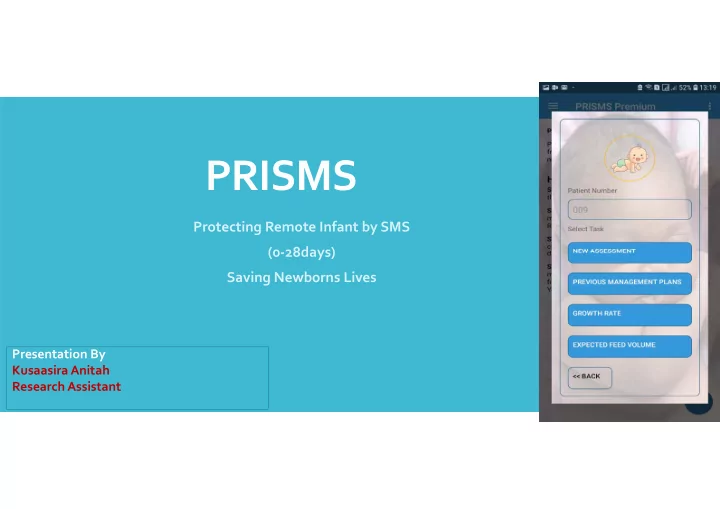

PRISMS Protecting Remote Infant by SMS (0 ‐ 28days) Saving Newborns Lives Presentation By Kusaasira Anitah Research Assistant
Annually 2.6 million under fives deaths occur globally with the biggest portion in sub-Saharan Africa Neonatal deaths account for 96% of all under 5 deaths Background Up to 75% of these occur in the first week of life from preventable causes.
Sick newborn care is considered highly specialized Most Frontline health workers feel inadequately trained Why neonatal to manage sick newborns death is still high? Therefore, there is need to empower frontline health workers to effectively manage sick newborns.
PRISMS
Objective 1: - To evaluate acceptability and feasibility of PRISMS among health Research workers (Paediatricians). Objective 2: Objectives - To conduct a pilot study to determine the feasibility and acceptability of using PRISMS in the delivery of newborn care at a rural health facility with no specialist paediatrician.
Objective 1: (Testing PRISMS among Pediatricians – n=7) Formulated 12 simulated pediatric cases Each pediatrician reviewed 6 randomly selected cases Cases that were managed by health worker would also be managed by PRISMS for comparison of management Methodology Questionnaires Target: Qualitatively and quantitatively measure the acceptability and feasibility of using PRISMS in determining the management of patients for simulated paediatric cases.
Objective 2: (Testing PRISMS at a health facility with no specialist – Bwizibwera HCIV n=12 ) Did refresher training in newborn assessment Training in using the technology – PRISMS Methodology Cases under this objective were not simulated – enrolled real patients continued.. Questionnaires Target: acceptability and feasibility of using PRISMS among frontline health care workers at a rural health facility.
Preliminary data: Analysis of data from our pilot project indicates the mean time to completion of patient assessment and development of a management plan using PRISMS was 2.2 minutes compared to 3.6 Preliminary minutes without PRISMS. The difference is statistically significant with p Results value <0.0001. Six of the seven pediatricians rated PRISMS as either good or very good in terms of ease of use.
Parameter Strongly Disagre Neutral / Agree Strongl %age disagree e Not sure y agree PRISMS provides sufficient management of the 0 1 2 2 2 57.1% newborn I would use Prisms in the care of babies 0 0 2 3 3 85.7% There were aspects of care that I missed but got 0 1 0 4 2 85.7% reminded by PRISMS Preliminary PRISMS provides comprehensive newborn 0 1 2 4 0 57.1% management Results Cont’d The investigations provided by PRISMS were 0 0 0 6 1 100% adequate PRISMS can only be used outside Hospitals 2 2 2 1 0 14.3% PRISMS should be used by all health workers 0 1 1 4 1 71.4% PRISMS can be used in hospitals 0 0 1 4 2 85.7% The cases were easy to manage 0 1 1 0 5 71.4%
Cadre of health workers recommended to use PRISMS 8 7 6 5 Preliminary 4 Results Cont’d 3 2 1 0 Nurses/Midwives Clinical Officers Medical Officers Paediatricians Postgraduate trainees Intern Doctors Undergraduate Medical Student #REF!
All pediatricians recommended PRISMS for use by clinicians Five of the seven pediatricians rated PRISMS as either good Preliminary or very good in terms of time to receive the feedback from the server Results Cont’d Six of the seven pediatricians rated PRISMS as good in terms of time taken to complete filling information into the phone.
Doing a Randomised Controlled Trial (RCT) study. Deployed in 14 health facilities in Central and Rwenzori regions of Uganda Currently, The results will provide us with more evidence about the use of PRISMS in heath facilities
Dr.Data Santorino (PI) - Ugandan Paediatrician, Lecturer and MasterTrainer of Newborn programs Dr. Francis Bajunirwe ‐ Epidemiologist in the Department of Community Health at MUST. Experience in the design and Team analysis of clinical epidemiological studies. Composition Eng. Mukama Martin- Computer Engineer/Software Developer with 4 years experience in software development and system analysis. Anitah Kusaasira ‐ Midwife, Research assistant PRISMS.
THANK YOU
Recommend
More recommend